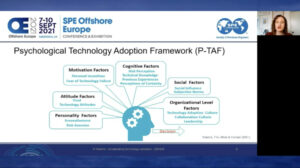New research examines innovation adoption culture within oil and gas industry

By Stephen Whitfield, Associate Editor
New research from Robert Gordon University (RGU) and the Net-Zero Technology Centre is providing findings that could help the traditionally risk-averse upstream oil and gas industry develop cultures that encourage and foster technology innovation and adoption. Based on the belief that psychological factors play a key role in technology adoption, the studies sought to help upstream decision makers better understand the influence that overarching organizational cultures have on employees and how they respond to and introduce new technologies within their companies.
“The psychological element is often forgotten or overlooked,” Ruby Roberts, Organizational Psychologist and Research Fellow, Aberdeen Business School at RGU, said at the 2021 Offshore Europe Conference on 8 September. “Many companies tend to focus on the technical aspects of a product – do you have a gap in the market that the product will actually fill, or a particular problem it will solve? But it’s the people that can make a product successful.”
The studies, conducted over two and a half years, led to the identification of 15 key psychological factors influencing technology adoption. Researchers also conducted benchmark testing among select operating companies to assess their innovation culture.
The project began with a literature review around the various innovation adoption models used in oil and gas and other industries, which illustrated the role that psychological factors play in the adoption of new technologies. To further examine this finding within the oil and gas industry, the research team then conducted interviews with key technology adoption decision makers in upstream oil and gas, primarily senior and middle management.
The initial interviews typically gathered information about the adoption of a specific technology – key dates, interactions, difficulties and other relevant information – that allowed the researchers to develop a timeline of the adoption process. Individuals were then asked about their jobs, their opinions on the technology in question and their experiences in introducing that technology into the field, including barriers and facilitators that impacted their experience.
Subsequent interviews were conducted with what they termed “gatekeepers,” such as consultants and representatives from startup companies developing new technologies for the industry.
The information gathered from these interviews helped the researchers identify 15 factors representing the major psychological constructs influencing technology adoption. The factors were organized into six categories:
- Personality factors: Individual differences in characteristics and behaviors that encompass a person’s worldview. These include innovativeness, or an individual’s orientation toward novelty and change, and risk aversion;
- Motivation factors: The impetus that gives purpose or direction to a person’s behavior. These include personal incentives, or the perceived rewards or punishments that act as drivers for behavior, and fear of technology failure, which relates to the personal implications for a decision maker if a technology adoption goes wrong;
- Attitude factors: Mental evaluations that a person forms about people, objects, events or ideas that can influence subsequent behavior;
- Cognitive factors: The mental processes that drive knowledge and understanding of the world, including risk perception, technical knowledge, previous experiences and perceptions of certainty, or the sense of certainty that a person has about a given prediction of current or future events and states;
- Social factors: The way in which people perceive, think about, interpret, categorize and judge their own social behaviors and those of others; and
- Organizational factors: The psychological factors that occur at the organizational level. This includes leadership, which Dr Roberts defined as the values, behaviors and attitudes of the people within an organization and how this influences the organizational culture. It also includes an organization’s collaboration culture and technology adoption culture, or the specific aspect within an organization’s culture that relates to how technology and innovation are valued.
All of the above factors identified related to the early stages of adoption decisions and processes; for example, a decision to invite a startup technology developer to give an internal presentation or agreeing to a field trial.
To better understand how these factors work in a realistic, operational context, the research team conducted industry benchmarking surveys over a two-month period, focusing on organizational technology adoption and assessing the extent to which organizational cultures value innovation.
The survey consisted of a 34-item questionnaire in which participants were asked to agree or disagree with statements on innovation adoption on a 1-5 scale. In total, 82 people from 12 operating companies completed the survey. The responses revealed that participants gave the lowest priority to organizational learning and competence, and innovation value received the second-lowest priority. Leadership and collaboration received the highest priority.
Participating companies received recommendations on how to foster innovation adoption culture based on their scores. These recommendations included:
- Identifying the ways in which leadership within an organization value innovation and how it can communicate that value within the wider organization;
- Looking at how innovation activities are prioritized within the organization, how innovation is discussed and how leadership can encourage creative and innovative thinking;
- Asking what the reaction within an organization might be if a new technology doesn’t work as expected; and
- Identifying ways of sharing lessons learned about technology uptake from prior projects.




